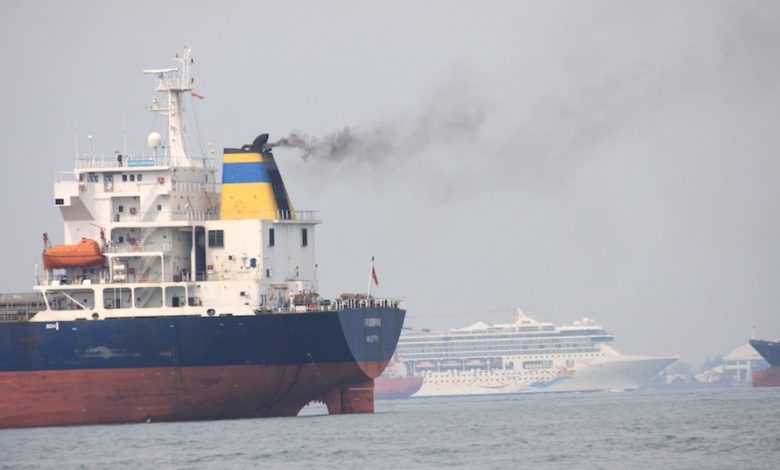EU adopts green fuel law for shipping

After two years of intense negotiations, the European Union (EU) has agreed on the final rules for climate-neutral shipping, with the adoption of the so-called FuelEU Maritime initiative.
The political agreement means that shipping will be covered by the EU’s emissions trading system (ETS) from 2024 and FuelEU Maritime from 2025, with shipping companies gradually reducing the climate impact of fuels. Additionally, there will be rules for the infrastructure of alternative fuels, including requirements for using shore power in selected larger ports.
“The new law will provide legal certainty for ship operators and fuel producers and help kick-start the large-scale production of sustainable maritime fuels, thus substantially delivering on our climate targets at European and global level,” said Raquel Sánchez Jiménez, Spanish Minister of Transport, Mobility and Urban Agenda.
The main objective of the initiative, as part of the EU’s Fit for 55 package, is to increase the demand for and consistent use of renewable and low-carbon fuels and reduce the greenhouse gas emissions from the shipping sector.
The new legislation aims to put maritime transport on the trajectory of the EU’s climate targets for 2030 and 2050 and should play a fundamental role in delivering on the European climate law.
The new regulation includes measures to ensure that the greenhouse gas intensity of fuels used by the shipping sector will gradually decrease over time, by 2% in 2025 to as much as 80% by 2050.
A special incentive regime will provide support for the uptake of renewable fuels of non-biological origin with a high decarbonisation potential and fossil fuels will be excluded from the regulation’s certification process.
Passenger ships and containers will have to use an onshore power supply for all electricity needs while moored in major EU ports as of 2030.
The regulation will also provide a voluntary pooling mechanism, under which ships will be allowed to pool their compliance balance with one or more other ships, with the pool – as a whole – having to meet the greenhouse gas intensity limits on average.
Also, revenues generated from the regulation’s implementation, or the so-called “FuelEU penalties” will be used for projects supporting shipping’s decarbonisation with an enhanced transparency mechanism.
The new regulation will be published in the EU’s official journal after the summer and will enter into force the twentieth day after this publication.
Commenting on the ambitious climate regulations, Jacob Clasen, deputy director general and deputy CEO of Danish Shipping, said: “This provides shipping companies, investors, and fuel producers with something to navigate by so that we can accelerate the green transition. There is political momentum in green shipping at the moment. We have just witnessed member states of the United Nations’ International Maritime Organization (IMO) reach a global climate agreement for shipping. This would not have happened without the efforts and ambitious climate package of the EU, which is now finalised. It will drive investments in green ships and motivate the accelerated production of green fuels for vessels.”

This a new… “Political approach” to Green targets having Regional bounds (within the EU), appears to be a set of metaphorical expressions of the style: “life is a highway”, or “the snow is a white blanket”… that are applied to objectives, or action plans to which they are not literally applicable. The reasons of this and the feckless assumptions leading to confrontations are obvious:
1) Regional Legislation, Regulations (EU/ETS, FuelEU), versus Global (UN Agencies) Maritime Law, IMO, or versus Flag States Common (Public) Laws and legislation, can only cause large distortion of established market trends, emanating from conflicting Regional and State interests, dictated by geopolitical issues and by the power of global economics, in an environment that onerous expectations of a self-sustainable regional “green paradise” have no effect.
2) What EU regional “Rules” for the Infrastructure may exist for “alternative fuels” without Safety and Quality assurance, type, origin, traded forms, ISO standards and specifications incl. properties that ensure safety, traceability, compatibility with “regulated” (not “guided”) technology and usability of all processes along all phases of the supply chain up to the point of consumption for powering. What are the required standards for the accuracy of calculation of those fuels intensity of emissions (well-to-wake). What “rules of infrastructure” may apply when the infrastructure itself is unknown for unspecified type of such fuels for use (e.g., facilities, equipment and their own powering needs, instrumentation, and other resources, location, storage, availability, custody transfer systems, uknown Capacities and so on).
3) In the “EU maritime Initiative” it seems that the Politicians and their supporting tech. connoisseurs compare apples with oranges when they unable to distinguish between carbon emissions and carbon intensity: The new regulation talks about measures of “carbon intensity” measured in terms of carbon emissions (2% in 2025 and 80% by 2050)….Difference between the two (and method of carbon intensity assessments) is unknown…What are the required standards for the accuracy of calculation of intensity of emissions (well-to-wake per each action) versus the carbon emissions by the Politicians?
4) The mentioned EU “Regulation for provision of a voluntary pooling mechanism” gives us a first hand doubt: … “There is NO Voluntary Regulation”…
5) Finally, a “trajectory” without rails on-the-“ground” leading to a hypothetical destination is simply Politics declarations that remain Politics.
Yawn.
…when difficult to comprehend…
No dear, just propaganda.